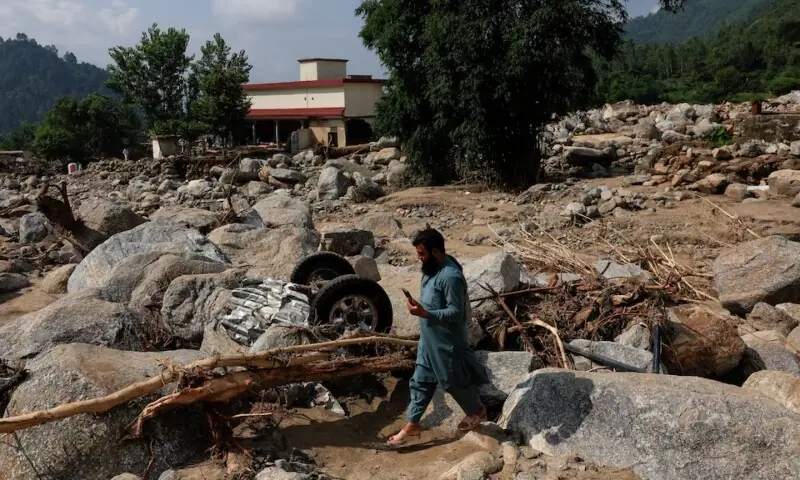Constant rains and raging floods in Khyber Pakhtunkhwa have already destroyed a large chunk of infrastructure and agricultural lands, including hundreds of houses, roads, and bridges, and washed away livestock.
The battered locals are now facing an even worse ordeal, the outbreak of waterborne and other diseases, in addition to psychological trauma.
The expected outbreak has prompted government health authorities and non-governmental relief organisations to set up makeshift clinics and medical camps, mainly across KP, to cope with the massive outbreaks of several waterborne and skin diseases.
Rains and flood-related accidents have already killed more than 400 people across the province since August 15, according to the Provincial Disaster Management Authority (PDMA).
“Post-floods situation is even more dangerous as the lurking threat of outbreak can kill more people than floods did,” warned Dr Abdul Ghafoor Shoro, the secretary general of the Pakistan Medical Association.
Speaking to Anadolu, Shoro called for an immediate “prevention plan” involving the provision of basic health necessities, including clean drinking water and hygiene, to mitigate the danger.
“Considering the given hygiene conditions, we cannot fully contain the outbreak and possible deaths, but a smart prevention plan can reduce the volume of a secondary disaster to a good extent,” he maintained.
Dr Mohammad Zahid Latif, head of the health division of Al-Khidmat Foundation, said that waterborne and skin diseases are already on the rise in the flood-stricken areas.
“Thousands of people, mainly children, have arrived with complaints of diarrhoea, gastroenteritis, dengue fever, malaria and skin issues. Thousands more [with similar complaints] are still stranded on the outskirts due to the blockade of roads and washing away of bridges,” he told Anadolu.
Reproductive and mental health requirements are another major issue, which the affected population is battling with, Latif pointed out.
“Many affected people have been brought to us with severe trauma and stress disorder because of the disaster they have gone through,” he said, fearing that the physical pain and injuries will heal in weeks or months, but the mental trauma will take a long time to go away.
Endorsing the view, Ataullah Khan, a spokesman for the KP Health Department, said the government had already taken steps to contain the problem.
“In addition to communicable diseases, people are also facing trauma and acute stress disorder. To handle the issue, the provincial government has sent trained psychiatrists to the flood-hit areas in collaboration with psychiatrist associations,” Khan told Anadolu.
CM gives 6-day deadline for payments to flood victims
Meanwhile, KP Chief Minister Ali Amin Gandapur chaired a meeting on the district-wise review of progress so far on payments of compensation to flood victims.
During the meeting, he issued a six-day deadline to officials for payments of all types of compensation.
“The pace of work on payments of compensation to victims should be further accelerated, ensuring payments of all types of compensation to victims by the upcoming Sunday. A feasible mechanism should be devised for payments of compensation to those minor children of deceased individuals who cannot have identity cards and bank accounts made,” the chief minister was quoted as saying in a statement on his X account.
CM Gandapur also ordered that compensation payments should be made to the relatives of those individuals who are still missing.
He said the amount required by the PDMA for payments of compensation to victims and rehabilitation works should be released immediately, adding that cash payments should be made to migrating families in Bajaur instead of non-food items.
He said additional teams from the health department should be deployed to expedite the verification process for the injured and affected homes and shops.
“Work should be started on collecting data for homes destroyed on waterways, discussions should be initiated with victims for constructing homes at safe locations for owners of such homes, arrangements should be made to pay 100,000 rupees per household for cleaning homes to those whose homes have floodwater and debris entered,” Gandapur said.
“The process of compensation payments to victims should be completed within the stipulated time so that we can start the early rehabilitation process. There is no shortage of resources for compensation payments to victims and rehabilitation. Complete transparency should be ensured in the use of funds for compensation payments to victims and rehabilitation works, for this purpose, the monitoring process should be made more effective.”



